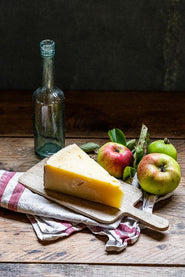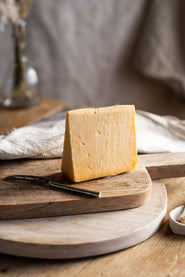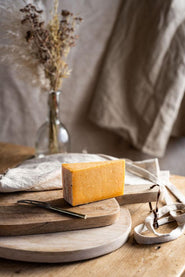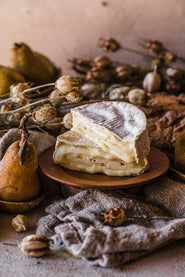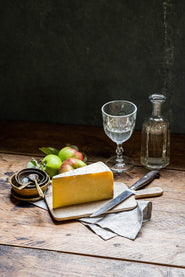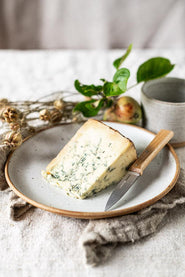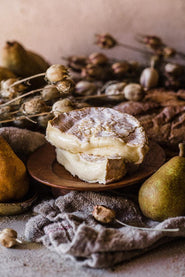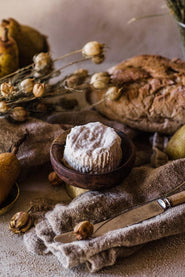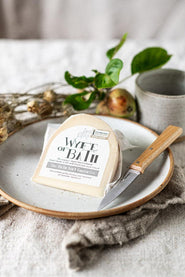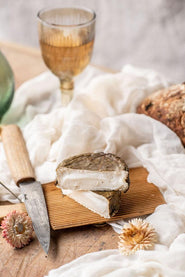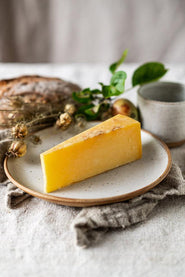Artisan cheesemakers have been on a rollercoaster this year. When lockdown was announced back in March 2020, leading to restaurants instantly closing their doors, British cheese makers were in a tailspin. There was mounting ripe cheese piled high in caves, cathedrals and maturation cellars around the country.
“Within the first two weeks we had lost 70% of our business, overnight” Jonny Crickmore, maker of Baron Bigod.
“It was like an atom bomb going off. The shockwave was unbelievable. We had all this cheese coming back to us, all existing orders cancelled. It took three days for us to stop charging around panicking.” Graham Kirkham, maker of Mrs Kirkham’s Lancashire.
At the very same time animals still needed feeding and milk still needed needed preserving. And as if all of that wasn’t challenging enough, add in the impacts of a disorganised exit from European export markets, meant a perfect storm had begun to swirl violently over the barns and farms of our British cheese makers.
‘Sir’ Jamie Oliver made a public plea for help, reminding his large following that British cheese is a vital part of our food culture and if we were not to step up now, it could be wiped out overnight.

We often bemoan the media for their tendency to lean towards click-bate headlines and rushed articles, lacking a deep-dive into the subject to which they write. However, we are lucky in this country to have some stellar food writers, who heard the cries for help and both quickly and knowledgeably sounded the siren. They really came up trumps, rallying the troops and giving a voice to the myriad of small scale, artisan makers who’s livelihood was on the line.
One such writer is Jenny Linford, whose battle cries echoed far and wide and gathered national support with her articles, such as ‘The British Cheese Crisis’ bringing to life the urgency of the situation sharing the stories of, in many cases, multigenerational, artisan businesses in serious peril.
It worked. The public saved British cheese.
Artisan cheesemakers were able to show their resilience and ride out the storm. As with every cloud, there was a silver lining, a new awareness and respect for this ancient craft had been cultivated, and cheesemakers found a new group of fans wanting more. Over the following months cheesemakers were supported by the British public, buying cheese online in their droves, discovering the varied textures, flavour profiles and nuance in our fabulous British cheese.
The history of British cheese in this country has been a tumultuous one. The last two years of disruptive food supply are not unique to this aged industry.

Cheese making in Britain began approximately 2,000 years ago during the pre-Roman times. Cheese has been a huge part of our British food culture for centuries, with Cheshire cheese, this country's oldest known cheese, mentioned in the 11th-century Domesday Book. During its long history cheesemaking has faced many challenges.
During the late 1530s Henry the VII announced his famous proclamation. He ordered to close all of the monasteries so that he could take control of the English Church and achieve his goal of marrying Anne Boleyn, without the consent of the Pope in Rome. The proclamation resulted in a serious decline in the cheese making as land was removed from the hands of noblemen and placed into the hands of those who agreed with Henry’s demands. It took until the early 17th century for British cheesemaking to reestablish itself, when British territorials such as Cheshire and Cheddar, and many of todays well known blue cheeses such as Stilton began to be made.

The World Wars I and II almost took British artisanal cheese making to the brink of collapse once again. During the war all milk production was taken under the wing of the British Government and its 'Milk Marketing Board’ with new controls and directives in place, cheese production became standardised creating a product called 'Government Cheddar’.
The Milk Marketing Board was responsible for regulating, providing licenses, and selling milk back to farmers for farmhouse cheese production, often making it uneconomical for the farmer. So began the trend towards cheese being made in large factories from milk sourced from a wide area.
Before the First World War there were over 3,500 farmhouse cheese makers in the UK. By the end of the Second World War, barely 100 were still making cheese.
Britain was the last country to end rationing, and it was not until 1954 that the restrictions were fully removed. British cheese makers had been abandoned by their government and with a depression now entrenched across the country, it took many years for traditional farmhouse cheese to recover.

By the 1980’s with wages and disposable income rising and food writers such as; Jane Grigson and Elizabeth David celebrating the food heritage of France and the Mediterranean, British people once more found a passion for traditional artisanal food and looked to our own shores for such delicacies.
Television programmes about our food heritage, such as the Two Fat Ladies, Rick Stein and Keith Floyd now took primetime slots. This led to a slew of people leaving the city wanting a taste of the good life, setting up entrepreneurial food businesses in rural Britain. Many of our most popular British cheeses, for example the renowned wash rind cheese; Stinking Bishop, were created during this time.
By the early 2000’s British cheeses were winning awards at the World Cheese Awards and rivalling prominent cheesemaking nations such as the French, Italians and Swiss, for their number of gongs. Things were on the up for British cheese.

Today, there is still a great deal of work to do to continue to enable a new revolution in British cheese. 90% of all British cheese is still sold through the top six supermarkets, of which 55% is large scale block Cheddar. There are only a handful of makers making raw milk Cheshire, Wensleydale, Double Gloucester and Clothbound Cheddar left in the UK.
It is completely true that the milk, butter and cheese we sell is more expensive that those you will find on the supermarket shelf. However there is a very big difference between the two. By choosing British artisan cheese and dairy you are sustaining traditional skills, better animal welfare, sustainable farming, resilient communities, fair wages… to name just a few. You are paying a bit more to sustain a better food system. If you are buying milk, butter, or cheese because it is cheap, all you are sustaining is corporate greed and the slow extinction of our food heritage.
Just like when we talk about native breed livestock, the same is true for cheese, if we want to hold onto our cultural heritage and encourage a new generation of thriving cheesemakers in this country, we have to ‘eat it, to keep it’.


